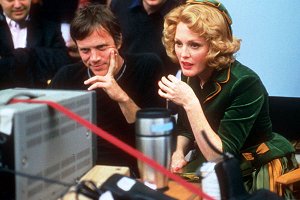

Rich: How can we see that?
Todd: Itís sort of committed to a bootleg existence unfortunately. Itís sad. I really hope someday we can change that. Itís up to Richard Carpenter; itís totally in his hands. But I made that film thinking I needed to get an MFA to get a teaching job. And around that time a friend from Brown was starting a nonprofit organization with some family money that would serve the film community in New York. So we started this nonprofit organization. We were interested in the way narrative traditions were beginning to seep into experimental film traditions at that point. And all of a sudden I was like barely living on a little salary but I was a producer of short experimental narrative films and a sort of arts financier. It put me into a community of filmmaking that would later sort of move into independent filmmaking in New York at the very end of the í80s. And at the same time Superstar was starting to get seen. And the three of us sort of said, ďWell maybe weíll collaborate on our first featureĒ around this time. So based on the strength of Superstar and our reputation we got grants to do a bigger project. And it was this Genet-related film. Barry [Ellsworth] did the cinematography, Christine [Vachon] produced it and I wrote and directed Poison. And both Superstar and Poison are probably my happiest memories in production because they were the furthest removed from any sense of film business or profession film career.
Rich: Just for the sheer love of it.
Todd: And they were collaborative, they were huge amounts of work, they were all the things that all films are. But yeah, they were much more free feeling. And then that film had its own kind of surprising little life to it. And all of a sudden I was branded as a feature filmmaker. But Iíve been very lucky. Iíve just done things I want to do. Iím not interested in the business or any of the apparent rewards of being a feature filmmaker. And Iíve had Christine helping me all along, fighting to get my films made.
Rich: Are there specific Issues or themes youíre trying to examine in your work?
Todd: The larger themes are sort of people at odds with their respective societies, and whether itís focusing more on those acts of rebellion or the acts of repression that make the rebellion necessary. But then within that general theme theyíre each quite different in the way they explore those themes and references they draw.

Rich: Thereís also a sort of mythical, mythological elementóthey all approach the story from a specific, storytelling point of view.
Todd: Yes they do, and they really regard film language and film history as something constructed but something that has an enormous role in our internal lives as a society. Something that both reflects and instructs us, something that sort of reflects our desires and also represses us into molds. And thatís an amazingly complex tradition to draw from, especially if youíre not just there to affirm it and either just make money or fulfill peopleís fantasies.

